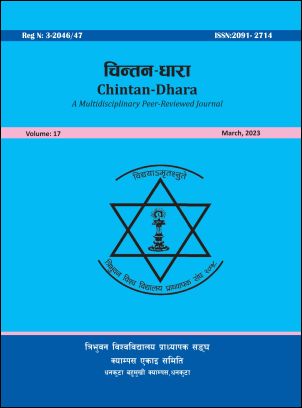‘कुम्भकर्ण’ निबन्धमा जागरण र सुषुप्ति {Awakening and Slumbering (Susupti) in the essay 'Kumbhakarna'}
DOI:
https://doi.org/10.3126/cd.v17i01.53266Keywords:
जागरण (awakening), दर्शन (philosophy), बन्धन (bond), मोक्ष (salvation), सुषुप्ति (slumbering)Abstract
लक्ष्मीप्रसाद देवकोटाको कुम्भकर्ण निबन्धमा पौरस्त्य दर्शनसँग सम्बन्धित जागरण र सुषुप्तिसम्बन्धी प्रभावको निरूपण गर्नु नै यस अध्ययन पत्रको मुख्य विषयवस्तु हो । सर्वेक्षण, सूक्ष्म पठन तथा पाठविश्लेषणको विधि प्रयोग गरी समग्रमा विश्लेषणात्मक विधिमार्फत सामान्यीकृत निष्कर्ष प्रस्तुत गरिएको यस निबन्धमा मानिसले आर्जन गरेका ज्ञानबाट जुन सत्य प्राप्त हुन्छ त्यो दर्शन हो भन्ने विचार प्रस्तुत गरिएको छ । पौरस्त्य दर्शन वैदिक वाङ्मयबाट विकसित दर्शन हो । कर्म सिद्धान्तमा विश्वास गर्ने यस दर्शनले आत्मसंयम र साधनामा जोड दिएको छ । पौरस्त्य दर्शनका मूलभूत प्रस्थापनाहरूमध्ये ईश्वर, बन्धन, मोक्ष, सांसारिक निरर्थकता, जागरण, सुषुप्ति जस्ता विषयहरूको सचेत असचेत प्रभाव परेको उक्त निबन्धमा लङ्काधिपति रावण र उसको भाइ कुम्भकर्णको चारित्रिक र स्वभावगत विशेषताहरूको तुलना गर्दे कुम्भकर्णका पक्षमा निबन्धकारका विचार पोखिएका छन् । रावण जागरण र भौतिकताको प्रतीक हो भने कुम्भकर्ण सुषुप्ति र आध्यात्मिकताको प्रतीक हो । वैभवशाली राजा भएर पनि रावणले आनन्द लिन नसकेको तर निद्रामा कुम्भकर्णले अनन्तको आनन्द लिएको सन्दर्भ प्रस्तुत छ । आनन्द प्राप्तिका लागि सुषुप्तिको मार्ग अवलम्बन गर्नुपर्ने, सुषुप्ति सुख स्वरूप भएको र सुषुप्ति नै मोक्ष प्राप्तिको प्रमुख कारक हो भन्दै सुषुप्तिको पक्ष लिँदै जागरण दुःख स्वरूप भएकाले जागरणतर्फ प्रवृत्त हुन नहुने निष्कर्षात्मक भाव यस निबन्धमा व्यक्त गरिएको छ ।
(The main theme of this study paper is to describe the effects of awakening and slumbering related to Paurastya philosophy in Kumbhakarna essay by Lakshmi Prasad Devkota. Using the survey methods, micro-reading and text analysis, generalized conclusions are presented through the overall analytical method. In this essay, the idea has been presented that the truth obtained from the knowledge acquired by humans is philosophy. Paurastya philosophy is a philosophy developed from Vedic literature. This philosophy, which believes in the principle of karma, emphasizes self-restraint and self-restraint. Among the basic principles of Paurastya philosophy, the conscious and unconscious influence of subjects like God, bondage, salvation, worldly futility, awakening, and sleeplessness have been influenced in the essay. In this essay, the writer's thoughts have been expressed in favor of Kumbhakarna by comparing the characteristics and temperament of the lord of Lanka, Ravana and his brother Kumbhakarna. Ravana is a symbol of awakening and physicality, while Kumbhakarna is a symbol of sleep and spirituality. There is a reference to the fact that despite being a glorious king, Ravana was not able to enjoy, but Kumbhakarna enjoyed eternity in his sleep. This essay has expressed the conclusion that one should follow the path of sushupti for happiness, that sushupti is a form of happiness and that sushupti is the main factor for attaining salvation.)




